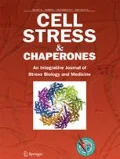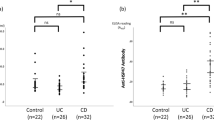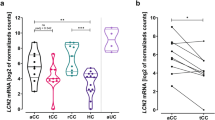Abstract
The purpose of this work was to determine in colon mucosa of Crohn’s disease (CD) and ulcerative colitis (UC) in relapse: a) the levels of the chaperonins Hsp60 and Hsp10; b) the quantity of inflammatory cells; and c) if the levels of chaperonins parallel those of inflammation cells. Twenty cases of CD and UC and twenty normal controls (NC) were studied using immunohistochemistry, Western blotting and immunofluorescence. Immunohistochemically, Hsp60 and Hsp10 were increased in both inflammatory bowel diseases (IBD) compared to NC. These results were confirmed by Western blotting. Hsp60 and Hsp10 occurred in the cytoplasm of epithelial cells in CD and UC but not in NC. Hsp60 and Hsp10 co-localised to epithelial cells of mucosal glands but not always in connective tissue cells of lamina propria, where only Hsp60 or, less often, Hsp10 was found. Cells typical of inflammation were significantly more abundant in CD and UC than in NC. Since chaperonins are key factors in the activation of the immune system leading to inflammation, we propose that they play a central role in the pathogenesis of the two diseases, which, consequently, ought to be studied as chaperonopathies.

Similar content being viewed by others
References
Baca-Estrada ME, Gupta RS, Stead RH, Croitoru K (1994) Intestinal expression and cellular immune responses to human heat-shock protein 60 in Crohn’s disease. Dig Dis Sci 39:498–506
Bouma G, Strober W (2003) The immunological and genetic basis of inflammatory bowel disease. Nat Rev Immunol 3:521–533
Cappello F, Zummo G (2005) HSP60 expression during carcinogenesis: a molecular “proteus” of carcinogenesis? Cell Stress Chaperones 10:263–264
Cappello F, Bellafiore M, Palma A, Marciano V, Martorana G, Belfiore P, Martorana A, Farina F, Zummo G, Bucchieri F (2002) Expression of 60-kD heat shock protein increases during carcinogenesis in the uterine exocervix. Pathobiology 70:83–88
Cappello F, Rappa F, David S, Anzalone R, Zummo G (2003a) Immunohistochemical evaluation of PCNA, p53, HSP60, HSP10 and MUC-2 presence and expression in prostate carcinogenesis. Anticancer Res 23:1325–1331
Cappello F, Bellafiore M, David S, Anzalone R, Zummo G (2003b) Ten kilodalton heat shock protein (HSP10) is overexpressed during carcinogenesis of large bowel and uterine exocervix. Cancer Lett 196:35–41
Cappello F, Bellafiore M, Palma A, David S, Marcianò V, Bartolotta T, Sciumè C, Modica G, Farina F, Zummo G, Bucchieri F (2003c) 60KDa chaperonin (HSP60) is over-expressed during colorectal carcinogenesis. Eur J Histochem 47:105–110
Cappello F, David S, Rappa F, Bucchieri F, Marasà L, Bartolotta TE, Farina F, Zummo G (2005) The expression of HSP60 and HSP10 in large bowel carcinomas with lymph node metastase. BMC Cancer 5:139
Cappello F, Conway de Macario E, Marasà L, Zummo G, Macario AJ (2008) Hsp60 expression, new locations, functions, and perspectives for cancer diagnosis and therapy. Cancer Biol Ther 7:801–809
Cappello F, Conway de Macario E, Di Felice V, Zummo G, Macario AJ (2009) Chlamydia trachomatis infection and anti-Hsp60 immunity: the two sides of the coin. PLoS Pathog 5:e1000552
Clynes R, Maizes JS, Guinamard R, Ono M, Takai T, Ravetch JV (1999) Modulation of immune complex-induced inflammation in vivo by the coordinate expression of activation and inhibitory Fc receptors. J Exp Med 189:179–185
Corrao S, Campanella C, Anzalone R, Farina F, Zummo G, Conway de Macario E, Macario AJ, Cappello F, La Rocca G (2010) Human Hsp10 and early pregnancy factor (EPF) and their relationship and involvement in cancer and immunity: current knowledge and perspectives. Life Sci 86:145–152
Czarnecka AM, Campanella C, Zummo G, Cappello F (2006) Heat shock protein 10 and signal transduction: a “capsula eburnea” of carcinogenesis? Cell Stress Chaperones 11:287–294
Devlin SM, Panaccione R (2010) Evolving inflammatory bowel disease treatment paradigms: top-down versus step-up. Med Clin N Am 94:1–18
Endo T, Yamano K (2009) Multiple pathways for mitochondrial protein traffic. Biol Chem 390:723–730
Fukushima K, Masuda T, Ohtani H, Sasaki I, Funayama Y, Matsuno S, Nagura H (1991) Immunohistochemical characterization, distribution, and ultrastructure of lymphocytes bearing T-cell receptor gamma/delta in inflammatory bowel disease. Gastroenterology 101:670–678
Hansen JJ, Bross P, Westergaard M, Nielsen MN, Eiberg H, Børglum AD, Mogensen J, Kristiansen K, Bolund L, Gregersen N (2003) Genomic structure of the human mitochondrial chaperonin genes: HSP60 and HSP10 are localised head to head on chromosome 2 separated by a bidirectional promoter. Hum Genet 112:71–77
Henderson B, Calderwood SK, Coates AR, Cohen I, van Eden W, Lehner T, Pockley AG (2010) Caught with their PAMPs down? The extracellular signalling actions of molecular chaperones are not due to microbial contaminants. Cell Stress Chaperones 15:123–141
Hibi T, Ogata H (2006) Novel pathophysiological concepts of inflammatory bowel disease. J Gastroenterol 41:10–16
Ikeda K, Monden T, Kanoh T, Tsujie M, Izawa H, Haba A, Ohnishi T, Sekimoto M, Tomita N, Shiozaki H, Monden M (1998) Extraction and analysis of diagnostically useful proteins from formalin-fixed, paraffin-embedded tissue sections. J Histochem Cytochem 46:397–403
Imamura Y, Kurokawa MS, Yoshikawa H, Nara K, Takada E, Masuda C, Tsukikawa S, Ozaki S, Matsuda T, Suzuki N (2005) Involvement of Th1 cells and heat shock protein 60 in the pathogenesis of intestinal Behcet's disease. Clin Exp Immunol 139:371–378
Johnson BJ, Le TT, Dobbin CA, Banovic T, Howard CB, Flores Fde M, Vanags D, Naylor DJ, Hill GR, Suhrbier A (2005) Heat shock protein 10 inhibits lipopolysaccharide-induced inflammatory mediator production. J Biol Chem 280:4037–4047
Kamphuis S, Kuis W, de Jager W, Teklenburg G, Massa M, Gordon G, Boerhof M, Rijkers GT, Uiterwaal CS, Otten HG, Sette A, Albani S, Prakken BJ (2005) Tolerogenic immune responses to novel T-cell epitopes from heat-shock protein 60 in juvenile idiopathic arthritis. Lancet 2–8(366):50–56
Kol A, Lichtman AH, Finberg RW, Libby P, Kurt-Jones EA (2000) Cutting edge: heat shock protein (HSP) 60 activates the innate immune response: CD14 is an essential receptor for HSP60 activation of mononuclear cells. J Immunol 164:13–17
Kucharzik T, Maaser C, Lügering A, Kagnoff M, Mayer L, Targan S, Domschke W (2006) Recent understanding of IBD pathogenesis: implications for future therapies. Inflamm Bowel Dis 12:1068–1083
Ludwig D, Stahl M, Ibrahim ET, Wenzel BE, Drabicki D, Wecke A, Fellermann K, Stange EF (1999) Enhanced intestinal expression of heat shock protein 70 in patients with inflammatory bowel diseases. Dig Dis Sci 44:1440–1447
Macario AJL, Conway de Macario E (2005) Sick chaperones, cellular stress and disease. N Engl J Med 353:1489–1501
Macario AJL, Conway de Macario E (2007) Chaperonopathies by defect, excess or mistake. Ann NY Acad Sci 1113:178–191
Macario AJL, Cappello F, Zummo G, Conway de Macario E (2010) Chaperonopathies of senescence and the scrambling of interactions between the chaperoning and the immune systems. Ann NY Acad Sci, in press
Mayadas TN, Tsokos GC, Tsuboi N (2009) Mechanisms of immune complex-mediated neutrophil recruitment and tissue injury. Circulation 120:2012–2024
McGuckin MA, Eri R, Simms LA, Florin TH, Radford-Smith G (2009) Intestinal barrier dysfunction in inflammatory bowel diseases. Inflamm Bowel Dis 15:100–113
Merendino AM, Bucchieri F, Campanella C, Marcianò V, Ribbene A, David S, Zummo G, Burgio G, Corona DF, Conway de Macario E, Macario AJL, Cappello F (2010) Hsp60 is actively secreted by human tumor cells. PLoS ONE 5:e9247
Nara K, Kurokawa MS, Chiba S, Yoshikawa H, Tsukikawa S, Matsuda T, Suzuki N (2008) Involvement of innate immunity in the pathogenesis of intestinal Behçet's disease. Clin Exp Immunol 152:245–251
Ohashi K, Burkart V, Flohé S, Kolb H (2000) Cutting edge: heat shock protein 60 is a putative endogenous ligand of the toll-like receptor-4 complex. J Immunol 164:558–561
Osterloh A, Kalinke U, Weiss S, Fleischer B, Breloer M (2007) Synergistic and differential modulation of immune responses by Hsp60 and lipopolysaccharide. J Biol Chem 282:4669–4680
Osterloh A, Veit A, Gessner A, Fleischer B, Breloer M (2008) Hsp60-mediated T cell stimulation is independent of TLR4 and IL-12. Int Immunol 20:433–443
Otaka M, Odashima M, Watanabe S (2006) Role of heat shock proteins (molecular chaperones) in intestinal mucosal protection. Biochem Biophys Res Commun 348:1–5
Otani S, Otaka M, Jin M, Okuyama A, Itoh S, Iwabuchi A, Sasahara H, Itoh H, Tashima Y, Masamune O (1997) Effect of preinduction of heat shock proteins on acetic acid-induced colitis in rats. Dig Dis Sci 42:833–846
Peetermans WE, D’Haens GR, Ceuppens JL, Rutgeerts P, Geboes K (1995) Mucosal expression by B7- positive cells of the 60-Kilodalton heat-shock protein in inflammatory bowel disease. Gastroenterology 108:75–82
Petrof EO, Ciancio MJ, Chang EB (2004) Role and regulation of intestinal epithelial heat shock proteins in health and disease. Chin J Dig Dis 5:45–50
Pockley AG, Multhoff G (2007) Cell stress proteins in extracellular fluids: friend or foe? Novartis Found Symp 291:86–100
Pockley AG, Muthana M, Calderwood SK (2007) The dual immunoregulatory roles of stress proteins. Trends Biochem Sci 33:71–79
Puga Yung GL, Fidler M, Albani E, Spermon N, Teklenburg G, Newbury R, Schechter N, van den Broek T, Prakken B, Billetta R, Dohil R, Albani S (2009) Heat shock protein-derived T-cell epitopes contribute to autoimmune inflammation in pediatric Crohn’s disease. PLoS One 2(4):e7714
Rugtveit J, Brandtzaeg P, Halstensen TS, Fausa O, Scott H (1994) Increased macrophage subset in inflammatory bowel disease: apparent recruitment from peripheral blood monocytes. Gut 35:669–674
Shashidharamurthy R, Hennigar RA, Fuchs S, Palaniswami P, Sherman M, Selvaraj P (2008) Extravasations and emigration of neutrophils to the inflammatory site depend on the interaction of immune-complex with Fcgamma receptors and can be effectively blocked by decoy Fcgamma receptors. Blood 111:894–904
Stahl M, Ludwig D, Fellermann K, Stange EF (1998) Intestinal expression of human heat shock protein 90 in patients with Crohn's disease and ulcerative colitis. Dig Dis Sci 43:1079–1087
Stevens TR, Winrow VR, Blake DR, Rampton DS (1992) Circulating antibodies to heat-shock protein 60 in Crohn's disease and ulcerative colitis. Clin Exp Immunol 90:271–274
Sukegawa Y, Kamiya S, Yagita A, Sugamata M, Atomi Y (2000) Induction of autoimmune colitis by Yersinia enterocolitica 60-kilodalton heat-shock protein. Scand J Gastroenterol 35:1188–1193
Tatsuta T (2009) Protein quality control in mitochondria. J Biochem 146:455–461
Tatsuta T, Langer T (2008) Quality control of mitochondria: protection against neurodegeneration and ageing. EMBO J 27:306–314
van Eden W (1991) Heat-shock proteins as immunogenic bacterial antigens with the potential to induce and regulate autoimmune arthritis. Immunol Rev 121:5–28
van Eden W, Wick G, Albani S, Stress CI (2007) Heat shock proteins, and autoimmunity how immune responses to heat shock proteins are to be used for the control of chronic inflammatory diseases. Ann N Y Acad Sci 1113:217–237
Viera AJ, Garrett JM (2005) Understanding interobserver agreement: the Kappa Statistic. Fam Med 37:360–363
Wang Y, Kelly CG, Singh M, McGowan EG, Carrara AS, Bergmeier LA, Lehner T (2002) Stimulation of Th1-polarizing cytokines, C-C chemokines, maturation of dendritic cells, and adjuvant function by the peptide binding fragment of heat shock protein 70. J Immunol 169:2422–2429
Wang Y, Whittall T, McGowan E, Younson J, Kelly C, Bergmeier LA, Singh M, Lehner T (2005) Identification of stimulating and inhibitory epitopes within the heat shock protein 70 molecule that modulate cytokine production and maturation of dendritic cells. J Immunol 174:3306–3316
Acknowledgements
This work was supported by funds of University of Palermo (VR, SD, GZ and FC) and Istituto Euro-Mediterraneo di Scienza e Tecnologia (FC).
Author information
Authors and Affiliations
Corresponding author
Additional information
Vito Rodolico and Giovanni Tomasello contributed equally to the present work.
Rights and permissions
About this article
Cite this article
Rodolico, V., Tomasello, G., Zerilli, M. et al. Hsp60 and Hsp10 increase in colon mucosa of Crohn’s disease and ulcerative colitis. Cell Stress and Chaperones 15, 877–884 (2010). https://doi.org/10.1007/s12192-010-0196-8
Received:
Revised:
Accepted:
Published:
Issue Date:
DOI: https://doi.org/10.1007/s12192-010-0196-8




